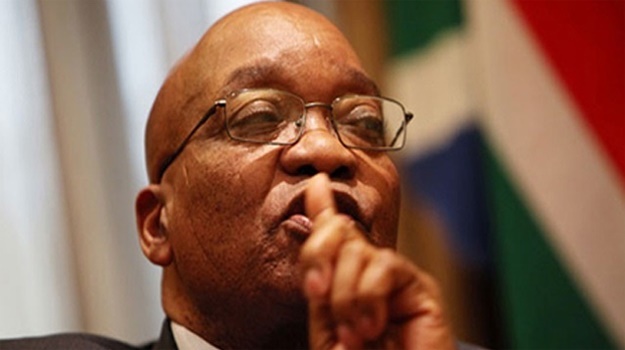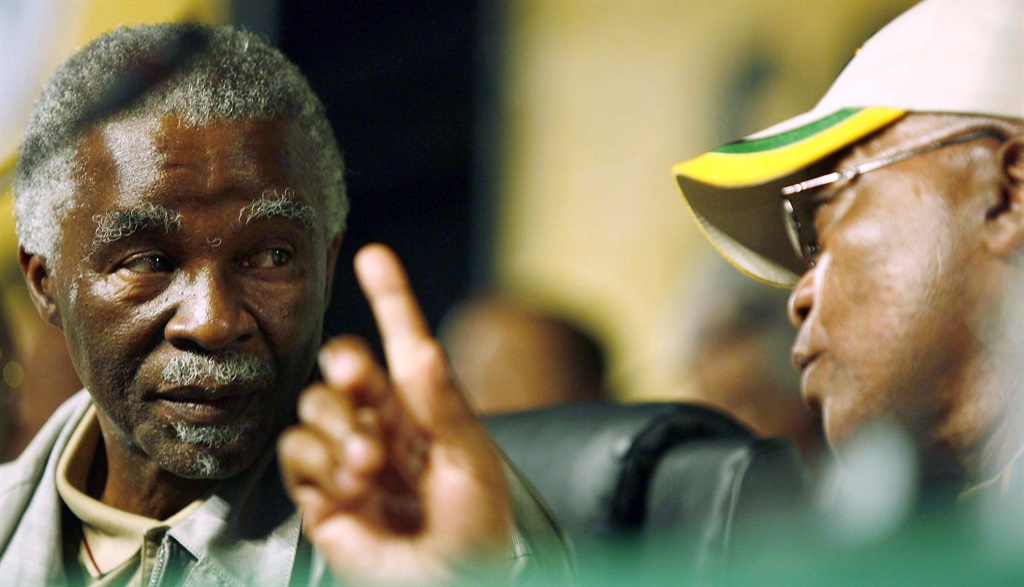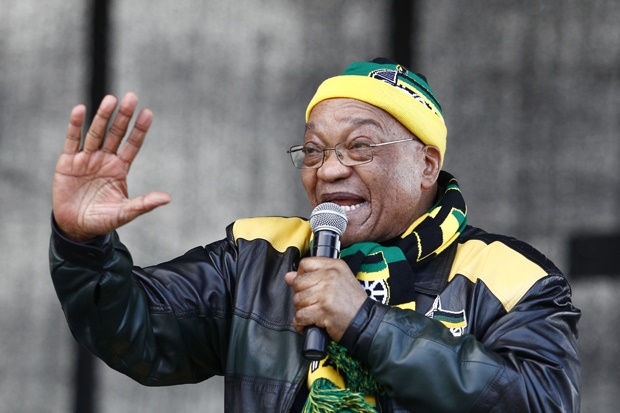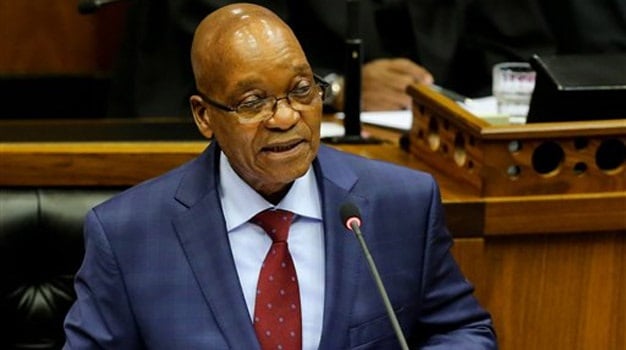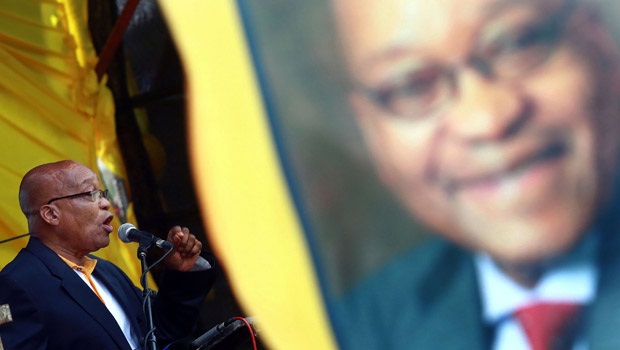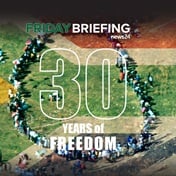February 9, 2018 would have been a good day for Jacob Zuma. He would have woken up feeling ecstatic that the previous day, on February 8, he had delivered his penultimate State of the Nation Address.
Whether opposition parties would have heckled him or not, he wouldn't care. Anyway, he was never bothered by what had become characteristic of his appearances in Parliament.
But February 9 would have been far more important for another reason: it is a date that signified the beginning of his ill-gotten fortunes and political troubles. That day marked the political turning point for Zuma, his family, the ANC and, more importantly, the country. It anchored his rise to power and simultaneously sowed the seeds of his dramatic fall.
If you want to understand the politics of Zuma, look not at his election as ANC president in 2007 or his inauguration as the country's president two years later. However important these were, they were subordinate to something far more important for him.
Look instead at February 9, 2001, the day a French arms manufacturer paid its first installment of a R500 000 bribe brokered by Zuma's financial advisor Schabir Shaik. The purpose was to convert Zuma, then deputy president, into an agent of the French company inside the South African government.
So, whenever there were threats to investigate this company, which was suspected of having paid dodgy commissions to get a stake in the multibillion rand arms deal tender, Zuma would defend it. In other words, he would work against state agencies who posed a threat to the company.
And whenever there were potential opportunities to advance the company's business interests, Zuma would be its covert ambassador within the democratic state.
The deal was sweet. It was money for jam – so exciting for Zuma, it probably came only second to the acquisition of a new wife or girlfriend. With the money, he would begin to realise his dream of building his Nkandla homestead and looking after a growing family.
At almost 60, he was not done making children. He once joked that the ANC needed more voters. His polygamous propensities were quite expansive.
All that was required of Zuma, in terms of the bribe contract, was to do the company's bidding for a fee, while earning his normal salary at taxpayers' expense as a public representative. Thus began Zuma's perennial conflict of interest – a feature of not only his personality, but his ruinous leadership style.
In the definition of an honest politician by Simon Cameron, the corrupt US secretary for war in President Abraham Lincoln's cabinet, Zuma was confirmed as an honest politician to his handlers: "one who, when he is bought, stays bought".
Coalition of the wounded
After the bribery was confirmed in the High Court judgment against Shaik - who was sentenced to 15 years in jail for corruption and fraud - President Thabo Mbeki fired Zuma in June 2005. But the axe fell on him after he had turned down an opportunity for him to resign, protesting he had done nothing wrong.
Claiming innocence in the face of facts that point to the opposite has been one of Zuma's tactics. It laid the foundation for what would be his approach in the years that followed, when he was asked to quit or account for countless breaches of the Executive Code of Ethics, laws and the Constitution.
Shortly after he was fired from Cabinet, he cut a sad, lonely figure at a Tuynhuys press conference. His shirt and suit hung shakily over his body frame. He looked like he had lost weight dramatically in a short space of time – you could be convinced you were listening to a genuine political victim.
His dismissal by Mbeki would provide a campaign message of victimhood for him, those sympathetic to his plight and Mbeki's critics. Protesting innocence and victimhood proved to be a potent cocktail.
With the help of the coalition of the wounded, Zuma soon traversed the country, canvassing support ahead of the ANC's 2007 elective conference. He became a magnet around whom the wounded would coalesce as a formidable group. His legal predicament, arising out of alleged criminal conduct, was converted into a political opportunity.
He became the figurehead of conflicting anti-Mbeki campaigns, egging him on to challenge for the leadership of the ANC. A Zuma movement was born, with the ANC transformed into a personal machinery. In a celebrity and hero-obsessed society, it was a remarkable achievement.
The Umshini wam song became the signature song and "100% Zulu Boy" the official cultural signature of paraphernalia dedicated to mobilise support for Zuma as the victimhood took an ethnic tone. Ethnicity and regionalism were to be of key consideration in his political game – from the beginning to the end.
For an uneducated man, who could barely write or count, he had to mobilise all available tools reactionary or not – to resurrect his political career. In Max Weber's conception, he, like many in his party, lived from politics and not for politics.
It was not easy and he was not going to enjoy the fruits of bribery, as he was under investigation by the Scorpions and the National Prosecuting Authority was on the verge of charging him.
The Zuma project
When he defeated the sitting president in December 2007 in Polokwane, he was credited for his political acumen. He earned the title of a master tactician. A peasant from rural KwaZulu-Natal who defeated a University of Sussex economics graduate. It was a massive fit.
He had showed, in the words of then Cosatu general secretary Zwelinzima Vavi, that he was an unstoppable tsunami. Julius Malema, then leader of the ANC Youth League, soon declared he would kill for him. For Blade Nzimande, leader of the SA Communist Party, Zuma's victory signalled paradigm change in the relationship between the ANC and the alliance partners.
His rural upbringing meant that Zuma would be sympathetic to the poor. Unlike Mbeki, who was perceived to be aloof, Zuma was warm and willing to listen. The newly elected National Executive Committee (NEC) was prepared to do its best to assist him in dealing with the allegations of corruption.
Many NEC members promptly dismissed the allegations as a conspiracy hatched by Mbeki and his supporters to prevent Zuma from becoming president of the Republic. It was argued that, as deputy president of the ANC and the country, it was only logical for Zuma to ascend to both presidential positions.
Support groups were formed in his name. And after he triumphed in Polokwane, committees and brains trusts were set up to make him look good. Tokyo Sexwale, who withdrew his presidential bid in Polokwane and threw his weight behind Zuma, arranged basic economics lectures for Zuma and linked him up with the domestic and foreign investor community.
Zuma's rise was so compelling that some political analysts and senior journalists were prepared to dump their professional integrity in the service of the Zuma project. In KwaZulu-Natal, celebrations of his rise were elevated to regional achievement above his leadership qualities, or lack thereof.
Within government, state intelligence officials gave him state secrets to help him duck prosecution for corruption. So, it was that the spy tapes inexplicably ended up in hands of Zuma's lawyers. He would use them as evidence of political machinations against him.
Emerging out of the Polokwane conference, Zuma and his supporters were armed with a resolution to disband the Scorpions, the agency that had been a thorn in his side for, among other crimes, the R500 000 he had received on February 9. They had even raided his Johannesburg home to secure incriminating documents linked to his relationship with Shaik and the French company.
Zuma vs Mbeki
Zuma challenged the constitutionality of the raids all the way up to the Constitutional Court – and lost. And so began his fight with the very state institutions that the Constitution obliged him to help fulfil their constitutional duties. From the word go, he declared war on the Constitution. The oath of office would be a mere symbolism, to be forgotten shortly after recitation.
It was this case of the raid that caused Zuma to take keen interest in the composition of the Constitutional Court. I strongly believe that this is what cost Deputy Justice Dikgang Moseneke the position of Chief Justice.
Yet to be resolved, is a complaint against Western Cape Judge President John Hlophe, who allegedly tried to influence some Constitutional Court judges to rule in Zuma's favour. Moseneke was one of the key complainants in the matter.
Zuma's setback on the legality of the raids notwithstanding, his star was certainly on the rise. The spy tapes were enough to persuade the NPA to drop the charges against him without interrogating the merits.
Change was on the horizon. Power would be shift from the Union Buildings, where Mbeki was still occupying his office, to Luthuli House. This was good news for the alliance partners, Cosatu and the SACP, who for years had complained that policy making under Mbeki had been centralised around the Presidency in the Union Buildings, at the expense of Luthuli House.
There was going to be more of a consensus decision-making approach, as opposed to Mbeki's cold-hearted, know-it-all decision-making style. In the meantime, the spy tapes recording featuring a discussion between, among others, Scorpions boss Leonard McCarthy and former head of the NPA Bulelani Ngcuka discussing the timing of the charges came in handy. Zuma would use this to apply for his prosecution for bribery to be nullified. Acting head of the NPA Mokotedi Mpshe obliged.
But before that happened, in September 2008, Judge Chris Nicholson, in a judgment on Zuma's application to have the charges against him set aside, accused Mbeki of a political conspiracy against Zuma. Mbeki appealed.
The Supreme Court of Appeal gave Nicholson a lecture on "judicial function" and accused him of inserting his political views in matters that were not before the court. The SCA judgment in June 2009 came too late. Soon after the Nicholson judgment, Mbeki was recalled by the ANC NEC.
The politics of patronage
Zuma told Douglas Foster, an American journalist, that he felt Mbeki would survive the humiliation. "But then," Zuma said to Foster, "you know that he did much worse to me." Kgalema Motlanthe was selected to be a caretaker president. Zuma would later issue a false statement on behalf of the ANC NEC, saying that the public had lost confidence in the ANC under Mbeki, which is why the ANC had to act.
In fact, judging by what he told Foster, he was revenging his 2005 dismissal. But in a meeting with Mbeki, he assured him that despite the noises made by the likes of Julius Malema, who called for the president's head, Mbeki would complete his term.
"There is a debate about whether or not Zuma meant what he said, both in public and in private, about the removal of Mbeki," observed Frank Chikane, who was director-general in the Presidency under Mbeki.
The disjuncture between what Zuma said and did was one of the consistent attributes of his politics. Cognitive dissonance is how psychologist describe it.
He has, for example, spoken about following in the footsteps of Nelson Mandela – the key message of his inauguration. But his leadership style was the extreme opposite of Mandela's.
Punishing those who were perceived to be his enemies and rewarding those who were prepared to do his bidding would be the hallmark of Zuma's politics since then. Patronage was the means to an end. The end was political survival at all costs and continuous personal enrichment.
In May 2009, Zuma was inaugurated as president of the country after the ANC won in the general elections. It was a freezing winter and slightly windy day at the Union Buildings – perhaps a bad omen of what was to come under Zuma's presidency.
Yet, there was a lot of goodwill. At the inauguration, I spoke to several business people who were happy with the change of political leadership. They were happy that a young democracy was able to manage a delicate political transition peacefully.
Naively, many believed that, because Zuma had been through hardship arrests, detention, imprisonment, exile and dismissal as deputy president – he would not mess up the opportunity.
Presidency as crime scene
How beautiful it would've been if he had governed well. It would've proven that formal education was overrated and that human beings are able to rise above their difficult past, correct their mistakes and be great leaders. The doubting Thomases would be left with egg on their faces.
But the good wishes of many South Africans were not in sync with Zuma's plans. He had other ideas. For him, the higher office would buy him not only immunity from previous alleged crimes, but would also be a powerful platform from which to unleash the worst. To be precise, Zuma converted the office of the Presidency into a crime scene.
From being an agent of the West (French company), which contracted him for a mere R500 000 a year, Zuma graduated to bigger things. He became an agent of the Guptas from India, dealing in billions of rands. His son, Duduzane, would work with them as they benefitted from state contracts and licences.
In fact, Zuma's victory in Polokwane was followed by a flurry of companies and trusts opened by Zuma family members. It was almost as if their entrepreneurial flair had been stunted by the previous administration. Their time had come.
His wives would benefit directly from positions in Gupta-owned companies to secure dodgy home loans underwritten by the Guptas. Typically, he saw no conflict between his private interests and his public duties. His oath of office meant nothing.
Zuma used the presidential office and the patronage he could distribute through his power to appoint and fire Cabinet ministers, not as a way to improve service delivery, but to consolidate his support within the ANC, making the next ANC conference an easy victory for him.
He had to ramp up the patronage machinery. This was because the coalition of the wounded - who initially supported him, apparently on the basis of various principles - were no longer of use to him, as some of them had begun to question his leadership. They had begun to suggest that he was no longer the guy whose cart they were happy to draw.
Popular support wanes
Malema and his close comrades had been expelled for daring to criticise Zuma's style of leadership. Motlanthe, who had been his deputy president, could no longer stand Zuma's disregard for the Constitution and decided to contest him at the party's elective conference in 2012. And Vavi was singing a different tune within Cosatu. He was ultimately forced out.
Zuma's popular support had begun to wane. He was booed at Nelson Mandela's memorial service in front of world leaders. One of the tragic things about the Zuma's reign was to see Mandela being given an official funeral presided over by a sullied man.
At the 2012 Mangaung conference, Zuma's faction courted Cyril Ramaphosa to be his deputy, while simultaneously launching a campaign to block him from succeeding Zuma in the next elective conference in 2017.
On the other hand, opposition parties were intensifying their campaign to demonstrate that Zuma was never qualified to be the president. He should have been in prison. The DA went on a nearly decade-long campaign to obtain the spy tapes and afterwards embarked on a protracted battle to review and set aside the NPA's decision not to prosecute.
In 2017, Zuma conceded that dropping of the charges was irrational. The Supreme Court of Appeal confirmed this in its judgment, paving the way for the NPA to charge him. So, on the 17th anniversary of his receipt of the cash from the French arms company, he is facing the charges of corruption, racketeering, money laundering and tax dodging. He has come full circle.
The investigation into Zuma's symbiotically corrupt relationship between himself, Shaik and the French company, as well as the conviction of Shaik, should have served as a warning for Zuma. In fact, his rise to the presidency was a perfect opportunity for Zuma to demonstrate that he's not bad as he was made out to be by his detractors.
The Gupta scandals, like his sex scandals, proved there was something fundamental about Zuma: he was not the type to learn anything form previous misdemeanours. It's almost as if the man is incapable of learning, even from the experience of others.
The Gupta state capture was nothing more than the multiplication, several million of times, of the deal he had with the French arms manufacturer. What Zuma learned, though, was to build a short-term defence mechanism to shield him from accountability and for him to continue to facilitate the looting of state resources by his friend and family using the office of the Presidency.
Surrounded by sycophantic ministers
At the 2012 ANC conference, where the emboldened Guptas sat in the front row, Zuma ensured that the NEC was dominated by his allies. He could be accused of selling the country's executive authority, including the appointment of ministers, to the Guptas, but the NEC would do nothing to stop him.
Poll after poll would warn the ANC that it would lose support because of his corruption. Yet, the more the party declined, the more NEC members heaped praises on him. For his survival, Zuma was praised as a master tactician. Well, a short-sighted tactician, yes he was.
Despite the ANC's declining support, Zuma made it clear that the party's victory in the 2014 elections was proof that people were not concerned about his use of public funds to build his private home under the guise of security upgrades in Nkandla.
This was, of course, part of his political strategy. The achievements of electoral power, however poor in relative terms, were his personal achievement. Those who attacked him for his scandals, were attacking and seeking to weaken the ANC. Deliberately blurring his personal interests with the interests of the party was yet another survival tactic.
He reduced the entire party to a sycophantic defence tool, castigating Public Protector Thuli Madonsela for doing her job on the Nkandla investigation. He made Cabinet ministers and MPs look like fools.
Zuma resembled The Ruler of the fictitious Republic of Aburiria surrounded by sycophantic ministers in Ngugi wa Thiongo's novel Wizard of the Crow. They cheered his gaffes and waged a tough competition to please him – until the next reshuffle happened. To be fair to Zuma, he found willing partners in the foolish enterprise.
The foolishness was so communicable it affected Members of Parliament, educated senior government officials and skilled executives in state-owned enterprise – all of whom nodded as Zuma paved the way for the mismanagement and looting of state resources.
Reshuffles and conspiracy theories
To maintain the sycophancy and keep the patronage system running, Zuma increased the regularity of late-night reshuffles. Obsessed with material perks, no one could say no to a Cabinet offer, even if it came via his Cabinet labour brokers, the Guptas, who screened CVs to ensure that they employed the right stooges.
Zuma took advantage of the crass materialism that has gripped the ANC, and which he himself accurately symbolised, to play games with appointments in key state institutions. Anyone who stood in the Guptas' way was a stumbling block to Zuma's looting machinery and, therefore, had to be reshuffled. His Cabinet was large in size, but tiny in credibility and effectiveness. The same fate fell on board members of state-owned companies.
When the markets and investors reacted negatively to Cabinet changes meant to bolster Zuma's plans for South African to underwrite a nuclear deal with Russia, he and his supporters blamed the West. Thuli Madonsela was at some point accused of being an agent of the West. So were many other civil society leaders.
Pravin Gordhan was the last victim of dubious intelligence report claiming he worked for Western interests. A similar dossier was being concocted to be used as a justification to fire Ramaphosa from Cabinet if he lost to Zuma's ex-wife Nkosazana Dlamini-Zuma in the ANC's 54th leadership race.
These accusations, coming as they did from supporters of an agent of the West (French arms manufacturer) and an ardent admirer of the Eiffel Tower, were indeed rich.
So-called White Monopoly Capital was not spared by hired Gupta bots for allegedly blocking radical economic transformation. Gupta bots targeted South African journalists, critical commentators and business people for daring to defend the sovereign integrity of their country.
With Zuma, citizens never knew whether he meant what he said when he spoke about radical economic transformation. As he and his allies were busy blaming White Monopoly Capital his friends, the Guptas, and companies linked to his son were rerouting taxpayers' money from projects meant to transform agriculture in the Free State to their private accounts.
The pursuance of private at the expense of the public interests was one of the defining features of Zuma's misrule. He never had a sense of where the other started and ended. He was often compared to a rural chief. But that was an insult to chiefs. Well-groomed chiefs know how to distinguish between private and public interests. Only the uncouth don't. So, if he behaved liked a chief, he was an uncouth one who, in ancient days, would never have lasted as long as Zuma did in a top leadership position.
One wonders what would have happened to Zuma had he lived under the strict King Shaka, who was highly intolerant of anyone who sought to weaken his Kingdom. It's food for thought for those who prefer to analyse Zuma through that kind of angle.
Intolerance and chauvinism
Zuma is often credited for government's progressive HIV/Aids policy, which saw the exponential increase in the provision of anti-retroviral medication. That the new policy was adopted long before he became president, due to an order of the Constitutional Court, is hardly mentioned.
He also credited with having facilitated the appointment of the National Planning Commission and the adoption of the National Development Plan 2030. Perhaps he deserve this accolade – but up to a certain point. There is no point having a beautiful policy that you would hate to implement because it calls for the development of a capable state – an outcome that would be inimical to your state capture project.
Under Zuma, state institutions had to be deliberately weakened so that they don't immediately respond to the threat from within. Good examples are the National Prosecuting Authority, SARS, the Hawks, SAPS, and more importantly, Parliament.
In almost all indicators, South Africa either declined or remained stagnant under Zuma. The key ones that he had promised to fix, became worse under him: unemployment, poverty and inequality. So-called radical economic transformation yielded nothing. Just an example: one of the things he promised he would do when he took over power was to make sure that government paid suppliers quickly. He leaves office while his party is still promising the same.
The representative of the people was turned into the representative of one individual. Save for the cries of opposition parties, most of which had to end up in court for them to be heard and responded to, Parliament failed dismally to do its job while Zuma laughed, lied and giggled his way into the coffers of the Republic.
It was the courts that blocked many irrational decisions that Zuma took. But if often took time to block them. The wheels of justice often move to slow, while executive action, which Zuma controlled, was quicker.
Much has been said about the humble, down-to-earth Zuma. But South Africans experienced unmitigated arrogance, intolerance and chauvinism. Who will forget the disparaging remarks against clever blacks, gays and black people who cared for their dogs?
Of course, we can't forget the remarks that the job of women is to bear children and that those who wear revealing clothes are horny and therefore they want "it". Nor can we forget that having a shower after unprotected sex can save you from HIV infection. Yet, these are the things that the president of a modern South Africa believed in. Dearly so.
We should all hang our heads in shame that we have had a president like Zuma. Given the fact that he leaves behind unspeakable harm to the Republic and we will take time to recover, we can safely say that it was regrettably a lost decade.




 Publications
Publications
 Partners
Partners




